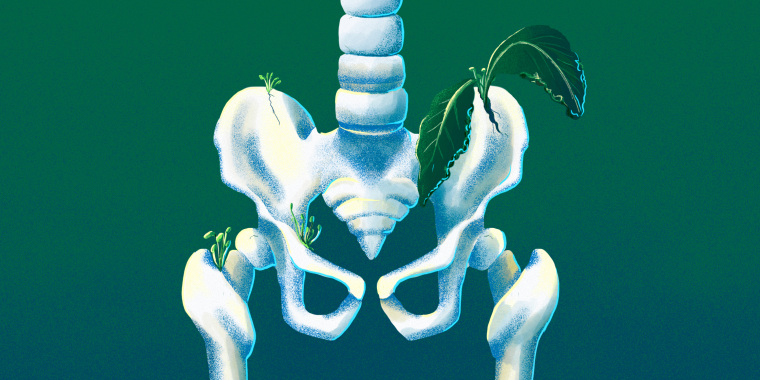Meatless diets can do lots of good things for your health, from protecting against cancer, heart disease and diabetes to helping you lose weight and reducing your risk of obesity. But a new study in the journal BMC Medicine reports that plant-based diets might not be the best choice for your bones.
When researchers from the University of Oxford and the University of Bristol tracked the eating habits of nearly 55,000 adults for roughly 18 years, they found that vegans, vegetarians and pescatarians were more likely to suffer hip fractures than meat eaters. However, some plant-based diets were more problematic than others. Vegetarians and pescatarians were roughly 25% more likely to fracture a hip than non-vegetarians. Vegans, by comparison, were at considerably higher risk, experiencing 2.3 times as many hip fractures and twice the number of broken legs as omnivores.
Why are plant eaters more fracture-prone?
“Vegetarian and vegan diets are typically very adequate, and often even higher in certain bone-building nutrients like magnesium, potassium, vitamin K and vitamin C than omnivore diets,” Ginger Hultin, a registered dietitian in Seattle and spokesperson for the Academy of Nutrition and Dietetics, told TODAY.
Yet vegans and strict vegetarians tend to consume smaller amounts of other important bone-supporting nutrients, particularly calcium, according to the Academy of Nutrition and Dietetics Vegetarian Nutrition Dietetic Practice Group. Why is that so critical? Our bodies require a steady stream of calcium for vital functions like blood clotting, muscle contraction and maintaining a healthy nervous system. When we consume sufficient calcium (roughly 1,000 to 1,200 milligrams per day), everything runs smoothly. But when dietary calcium is in short supply the body must tap into its calcium reservoir, namely the skeleton, to make up the shortfall. If this happens occasionally it’s not a problem. However, if it occurs repeatedly, bones can become weak, brittle and more likely to break.
Another concern is protein, which helps the body absorb calcium and aids in the bone-building process. Even though it’s possible to eat enough protein on a plant-based diet, some research suggests that vegetarians and vegans may not consume enough for optimal bone health. Perhaps even more critical is body weight. “The researchers in this study noted that lower BMI may be a major contributing factor to their findings,” said Hultin. “Vegetarian and vegan dietary patterns are associated with lower BMI, which is a risk factor for fractures.” Why? When a person weighs more, they have necessary padding to cushion and protect bones in the event of injury.
How can vegetarians and vegans protect their bones?
Bone strength is shaped by a combination of factors such as diet, lifestyle, age and genetics. While you can’t control your age or your genes, these strategies can keep your skeleton strong:
- Think food first. “I recommend calcium-rich plants versus calcium supplements, which may increase heart attack risk,” Lauren Panoff, a registered dietitian and plant-based lifestyle strategist based near Boulder, Colorado, told TODAY. However, calcium absorption from plants can vary considerably. Here’s how they stack up:
- Highest absorption. Kale, turnip greens, Chinese cabbage and bok choy.
- Moderate absorption. Calcium-set tofu, almonds, tahini, figs and oranges.
- Poor absorption. Spinach, beet greens and Swiss chard.
- Supplement strategically. “Two supplements I would consider are vitamin K2 and vitamin D,” said Panoff. “Vitamin K2 can help mobilize calcium to bones when taken with Vitamin D, which provides its own bone health benefits.”
- Strive for a healthy body weight. If you are underweight (meaning you have a BMI of less than 18.5), a few sessions with a registered dietitian can help you develop strategies to gain weight healthfully.
- Add in exercise. “Weight-bearing exercise, like jogging, playing tennis and climbing stairs, is essential for bone health, for plant- and meat-eaters alike,” said Panoff.
Putting the latest research in perspective
Although this new study is noteworthy for its size and duration, some experts say it’s not the last word. “This study has limitations,” said Panoff. “Most participants were Caucasian women, their diets were self-reported and no data was available on calcium supplement use or fracture causes.” Without insights into the causes of the participants’ fractures it is impossible to know if their broken bones were a result of accidents or from other underlying issues, such as osteoporosis.
“While this research is interesting and important, I don’t want people to automatically assume that vegans and vegetarians will have poor bone health,” said Hultin. “In the end, there are many, many factors to take into consideration when it comes to fracture risk.”


